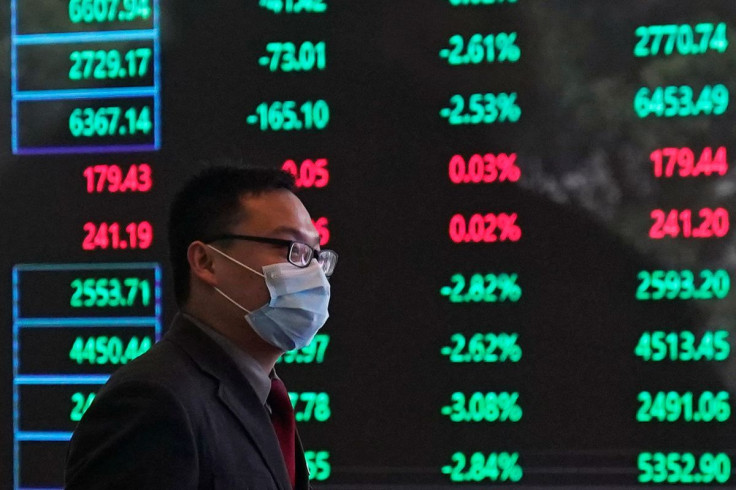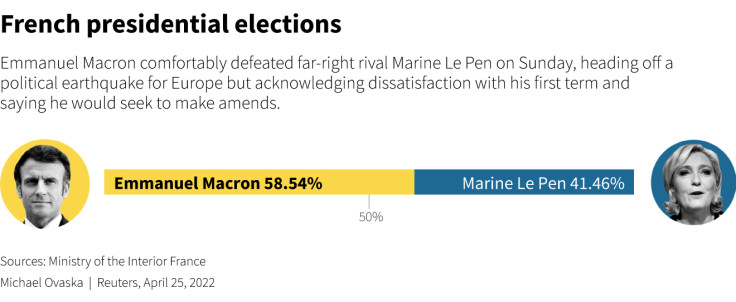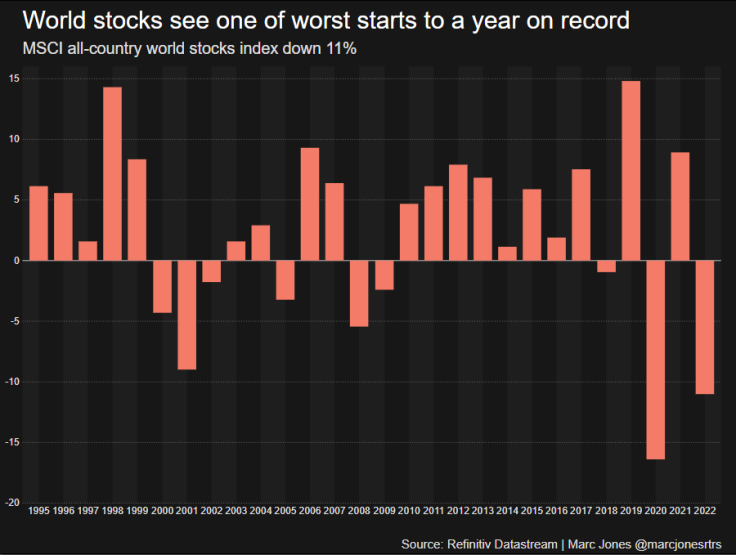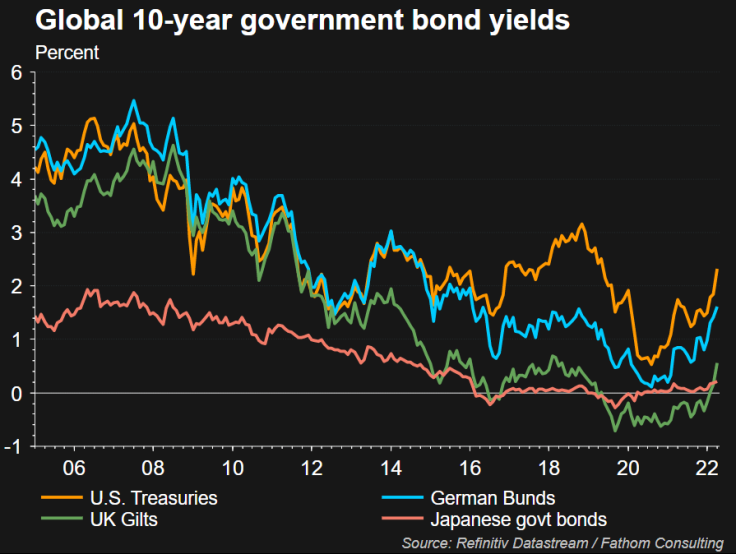Stocks, Oil Tumble As Recession Worry Offsets French Vote Relief

Traders ditched riskier assets on Monday as relief over Emmanuel Macron's victory in the French presidential election quickly gave way to renewed concerns about rising global interest rates and China's spluttering economy.
Asian markets had suffered their worst day in over a month overnight on fears that Beijing was about to go back into a COVID-19 lockdown, and as Friday's 2.5% Wall Street slump lingered on U.S. futures markets [.N].
The bashing continued in Europe. Despite relief that Macron had eased past far-right challenger Marine Le Pen on Sunday, the STOXX 600 index fell back to mid-March lows, weighed down by 1.5% and 1.0% drops in French and German shares, respectively.
The euro slid as much 0.75% as well, to its lowest since the initial COVID panic of March 2020.
"The reality is there is more to the French election story than Macron's win yesterday," said Rabobank FX strategist Jane Foley.
Not only are there parliamentary elections still to come in France in June, but Macron also seems likely to keep the pressure up for a Europe-wide ban on Russian oil and gas imports, which would cause serious economic pain, at least in the short term.
"We had German officials saying last week that if there was an immediate embargo of Russian energy then it would cause a recession in Germany. And if there was a recession in Germany, that would drag the rest of Europe down and have knock-on effects for the rest of the world," Foley said.
Graphic: FRANCE-ELECTION French presidential elections -

MSCI's broadest index of world shares was down 0.7% to a six-week low. Wall Street was expected to open 0.5%-1% lower [.N], oil fell over 4% and the Beijing worries saw the yuan skid to a one-year low. [.SS]
State television in China had reported that residents were ordered not to leave Beijing's Chaoyang district after a few dozen COVID cases were detected over the weekend.
The China-sensitive Australian dollar fell as much as 1.2% while the U.S. dollar climbed unhindered to a two-year high, hitting $1.0707 against the euro and 1.2750 versus Britain's pound in the process. [FRX/]
Much focus on is on how fast and far the Federal Reserve will raise U.S. interest rates this year and whether that, along with all the other current global strains, will help tip the world economy into recession.
This week is also a packed one for corporate earnings. Almost 180 S&P 500 index firms are due to report. Big U.S. tech will be the highlight, with Microsoft and Google on Tuesday, Facebook on Wednesday and Apple and Amazon on Thursday. [.N]
In Europe, 134 of the Stoxx 600 will also put out results, including banks HSBC, UBS and Santander on Tuesday, Credit Suisse on Wednesday, Barclays on Thursday and NatWest and Spain's BBVA on Friday. [.EU]
"I wonder whether just meeting expectations will be enough, it just feels like maybe we'll need a bit more," said Rob Carnell, ING's chief economist in Asia, referring to jitters about big tech following a dire report from Netflix last week.
"It's guidance about the future which will be as important as anything and I suspect most of these firms are going to be coming out and saying it all looks rather uncertain, which I don't think is going to really help."
Graphic: World stocks suffering one of worst ever starts to a year -

FEAR FACTOR
U.S. futures were pointing to more falls there [.N] although Twitter shares looked ready to jump on reports the company was set to accept Tesla-owner Elon Musk's offer to buy the microblogging site.
Friday had seen the Dow Jones suffer its worst day since October 2020 and the CBOE volatility index, dubbed Wall Street's "fear gauge", continue to drive higher on Monday. It has now risen 50% in the last few days. [.N]
"Concerns around rates and recession are now the biggest risks for investors", with a particular focus on demand, said Candace Browning, head of global research at Bank of America.
"Spiking food and gasoline prices plus the end of key stimulus programs has investors concerned about the low-income consumer's ability to spend."
Monday's earlier selloff in Asia also saw Hong Kong's Hang Seng fall 3.7% and the Shanghai composite index slide over 5% [.SS].
China's central bank had fixed the mid-point of the yuan's trading band at its lowest level in eight months, seen as an official nod for the currency's recent slide, and the yuan was sold further, to a one-year low of 6.5092 per dollar.
Metals were mangled too. Dalian iron ore fell more than 9%. Copper, a bellwether for economic growth, dropped 2.2% and Brent crude futures fell 4.5% to a two-week low of $101.78 a barrel. [O/R][MET/L]
Palm oil whipsawed and the Indonesian rupiah slid following a ban on exports from Indonesia that further stoked worldwide food price pressure.
The higher dollar pushed spot gold 0.8% lower to $1,913 an ounce. Cryptocurrency Bitcoin dropped to a six-week low of $38,202.
The bond markets got some relief at least. The benchmark 10-year yield was back at 2.8217% in early U.S. trading while Germany's 10-year yield, the benchmark for Europe, dipped as far as 0.87%. France's 10-year yield was also down around 7 basis points at 1.35%. [GVD/EUR][US/]
Money markets are now pricing in a 1 percentage point increase in U.S interest rates at the Federal Reserve's next two meetings and at least 2.5 points for the year as a whole, which would be one of the biggest annual increases ever seen.
This week will also see the release of U.S. growth data, European inflation figures and a Bank of Japan policy meeting, which will be watched for any hints of a response to a sharp fall in the yen, which has lost 10% in about two months.
Graphic: The only way is up! -

© Copyright Thomson Reuters 2024. All rights reserved.



















